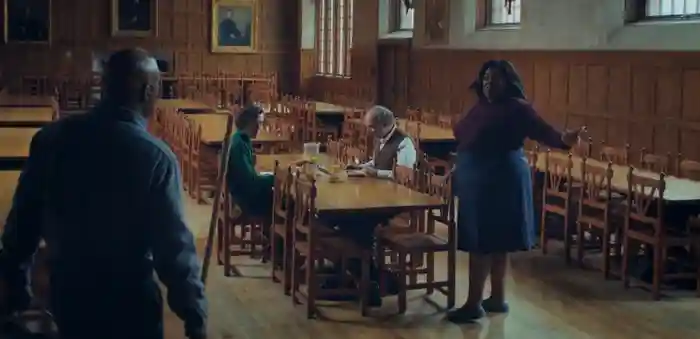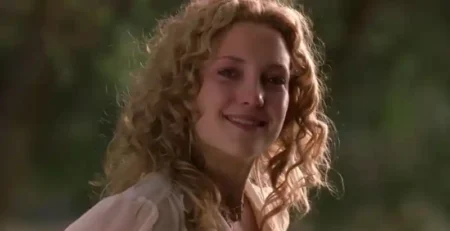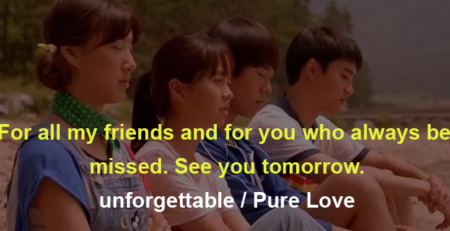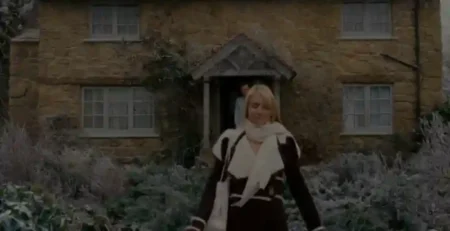The Holdovers (2023), directed by Alexander Payne and written by David Hemingson, is a quietly powerful dramedy set in the early 1970s. The film revolves around three people left behind at a New England boarding school over Christmas break: Paul Hunham (Paul Giamatti), a curmudgeonly professor; Angus (Dominic Sessa), a bright but troubled teenager; and Mary Lamb (Da’Vine Joy Randolph), the school cook grieving her son lost in Vietnam.
What makes The Holdovers so special is how it balances humor, sadness, and character study in a period setting without veering into sentimentality. Payne’s direction, combined with Hemingson’s sharp screenplay, gives the film texture: the boarding school is cold and isolating in more than just climate, and the holiday break isn’t the joyous respite one expects. Instead, it becomes a crucible for emotional revelations, unexpected bonds, and reflections on disappointment.
Paul Giamatti delivers one of his richest performances in years. His Paul Hunham is prickly, morally rigid, and clearly weary of his own life’s compromises. Watching him warm up, slowly, awkwardly, to Angus and Mary is satisfying, largely because Giamatti never lets us forget Hunham’s flaws. Dominic Sessa as Angus is excellent: a teenager full of intelligence and edge, yet deeply uncertain about his future. And Randolph’s Mary brings quiet heartbreak and dignity; her grief is handled with respect and layered complexity.
Visually and atmospherically, the film hits its marks. The 1970-setting is convincingly evoked via costumes, production design, and cinematography. It supports a mood that is nostalgic but never glossy. The score and soundtrack further reinforce the melancholic tone, offering moments of emotional lift without undermining the film’s more somber themes.
If there is a weakness, it lies in predictability. Some character arcs and conflicts feel familiar, the gruff teacher softened by misfit student, the grieving mother trying to find peace, etc. Also, a few critiques say that certain moments tip into being overly sentimental or cling to well-worn tropes. But even so, The Holdovers largely transcends those pitfalls because of its strong performances, honest dialogue, and tone that respects its characters.
Quotes from The Holdovers (2023)
“Poor kids are cannon fodder. Integrity is a punch line. Trust is just a name on a bank.” — Paul Hunham
This line is harsh, cynical, and beautifully captures Hunham’s world-weariness. It sheds light on his disillusionment, especially with how society treats the vulnerable.
“You can’t even dream a whole dream, can you? What are you afraid of?” — Mary Lamb
This confronts fear and invites vulnerability. It’s a moment in the film that challenges both Paul and the audience to consider what limits they impose on themselves.
“Mr. Tully, for most people, sex is 99 percent friction and one percent goodwill.” — Paul Hunham
This line blends character voice, humor, and a sort of crude wisdom. It reflects Hunham’s brusque teaching style — blunt, ironic, but undercut with insight.
“You know, Mr. Kountze, for most people, life is like a henhouse ladder: shitty and short. You were born lucky. Maybe someday, you entitled little degenerates will appreciate that. If you don’t, I feel sorry for you and we will have failed to do our jobs.” — Paul Hunham
It’s one of the more biting moments. It’s harsh, but in context, it reveals Hunham’s frustration with privilege and complacency, and his belief in duty beyond coddling.
“There’s nothing new in human experience, Mr. Tully. Each generation thinks it invented debauchery or suffering or rebellion, but man’s every impulse and appetite from the disgusting to the sublime is on display right here all around you.” — Paul Hunham
This is one of the more philosophical lines in the film. It pulls back from individual character to comment on history, human nature, and the illusion that our suffering or impulses are uniquely ours.
“Let’s just say I left home when I was fifteen.” — Paul Hunham
A quieter line, but one that adds pathos. It shows a crucial piece of Hunham’s backstory and contributes to understanding his distance, his pain, and how that shapes his relationship with his students.











